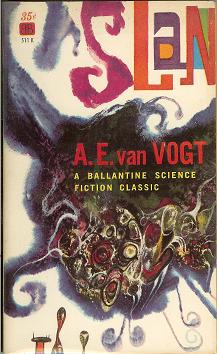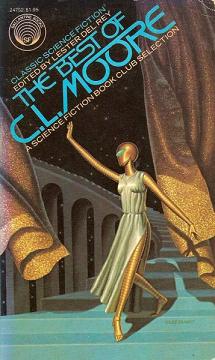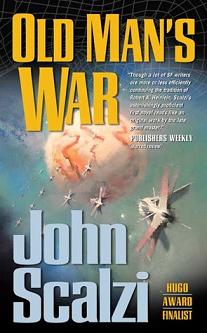
Slan
A. E. van Vogt
159 pages
published in 1940
“His mother’s hand felt cold, clutching his. Her fear as they walked hurriedly along the street was a quiet, swift pulsation that throbbed from her mind to his. A hundred other thoughts beat against his mind, from the crowds that swarmed by on either side, and from inside the buildings they passed. But only his mother’s thought were clear and coherent–and afraid.”
The opening sentences of Slan show why A. E. van Vogt was the most popular writer of science fiction’s Golden Age, somebody who in 1940 could not only be compared to an Asimov or Heinlein, but compared favourably. Van Vogt had honed his craft on writing “true confession” stories for the pulp market, then got into science fiction with a big bang in John Campbell’s Astounding Science Fiction with “Black Destroyer” — the story that would decades later inspire the Alien movie. For about a decade or so he was incredibly prolific, inventive and with an almost instinctive understanding of how to push his readers’ buttons, learned while writing sob stories for the romance pulps. All these qualities come together in Slan and if you want to understand van Vogt’s appeal, this is the best novel to try: short, focused and tense.
Slan is the story of Jommy Cross, a mutant, a slan, like all slans stronger and smarter than ordinary humans and equipped with two golden tendrils on his forehead which gives him the ability to read minds — but he’s only nine years old. And he and his mother are caught in the very centre of Centropolis, she sacrifising her own life to enable him to escape from the slan hunters, the secret police that shoots slans on sight, because slans are too dangerous to be allowed to life. Those slans who haven’t been murdered yet have to live in secret, hiding their abilities and their tendrils. Jommy does not know how many of them are still or if he’s the only one, but he knows that he is their last hope, that he has to survive to one day take on the might of the dictator of Earth, Kier Gray, as well as the chief of the secret police, the head slan hunter, John Petty. And then there’s the captive slan girl, Kathleen Layton, subject of a power struggle between the two men…

